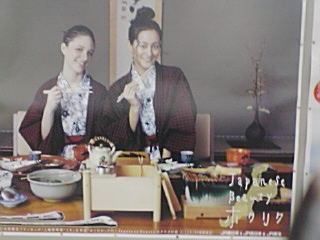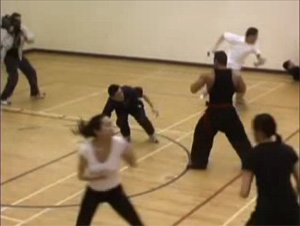Searching for Activism
My feminist activism is far from isolating. I meet and connect with great women and men who are my peers on campus or online in the blog network. But I sometimes feel disconnected from the people beyond my immediate circle; I feel that the ways in which I’m a participant in a global world are invisible to me. In my Global Women class this quarter, my classmates and I tried to see some of those connections. As university students in the United States, we are privileged to ignore them. For my own term project, I chose look to into who grows the organic, local produce I enjoy so much. I wanted to know: who grows it, and why didn’t I know already?
I live in Bellingham, a city along the Puget Sound between Vancouver and Seattle. I seldom adventure beyond walking distance of my campus and apartment, so I see little of farms and most of that is from a distance on the highway. In spring and summer, I walk downtown to purchase local produce at the Saturday Farmer’s Market. The people selling the produce usually look like me, and I don’t give much thought beyond the cooking I will do when I get home.
My project led me to a local group called Community to Community Development, “a place-based, grassroots organization committed to creating alliances in order to strengthen local and global movements towards social, economic and environmental justice.â€
¡Viva la Campesina!
How does this mission statement translate into practice? The panel I attended on Tuesday, February 28, 2006 is a good example; I’ll do my best to recount it. Pardon my slipping into pseudo-objective report mode, it’s not my usual writing style but I’m also turning this in for my class. I’m not sure how “accurate†this account is, but this is what I interpreted from what was said.
Organization director Rosalinda Guillen led the three panelists through sharing their experiences as farmworkers in my own Whatcom County and the adjacent Skagit County. The dialogue was held at Western Washington University and attended by both students and community members. I’m using fictional names of the panelists to preserve their privacy.
The presentation was bilingual, which challenged the pervasive English norm that surrounds me. Most of the farmworkers in the area are Hispanic. Language was used that the panelists were comfortable with, and the latter two speakers chose to talk to us in Spanish.
Anna
A woman named Anna was the first panelist to speak. She began with sharing her situation: fifty years old, in her thirty-first year of marriage, a mother of three, and grandmother of three. Originally from Texas, Anna’s family moved to the Skagit Valley when she was a young child and lived in labor camps for farmworkers. She began working in the labor camp at age five, and the fields at eight. When her family and their colleagues were able to find work, they were at it from dawn until dusk, seven days a week with no holidays. The labor camps were crowded–she recalled that the individual houses had bathrooms, but the camp shared communal showers. Labor camps are worse now than they were then, she said, because the same structures are used and are decaying with little or no maintenance.
Because farm work is seasonal, Anna’s parents often couldn’t find work and therefor relied on government assistance and help from relatives. It was a stressful time for her parents, Anna said, so she learned to be quiet and cooperative to avoid being a target. She didn’t want her dad to strike her. Anna pointed out that this was a tool for survival for people in powerless situations. “I want to help people in similar situations,†she said. She now works at Group Health so she can help people from her community.
Isabela
Isabela was the second panelist to speak. She moved to Yakima–a city in Eastern Washington–from Jalisco, Mexico in 1990 and sorted and packed apples, cherries, and pears. Eventually she moved to Bellingham. She is thirty-five and the mother of a young daughter; Isabela is currently unemployed and is looking for farmwork to support her family.
Isabela’s father was a bracero who, when she was a girl, traveled seasonally to the United States to find work. He lived in barracks-like with bunk-beds that housed several men to a room, and hundreds of men in each camp. Jobs typically were, she described, dawn to dusk with no holidays. Isabela’s father earned American dollars, which was more valuable than pesos, to send home to his family. Isabela feels that this little bit of extra income didn’t make up for the time he missed with his family.
Isabela’s father warned her not to travel to the United States because she’d be treated so poorly as a farmworker. She pointed out that now there are more considerations being made for farmworkers, including an hourly wages being at minimum wage, which is currently $7.63 in Washington (the highest in the country). But it still isn’t enough to get by, Isabela said.
Alessandra
Alessandra was the third and last person to speak on the panel. She moved to Bellingham, from Mexico, in 1996. She shared that she was a mother of three children–the youngest, and infant, with her at the panel. She primarily worked at a local organic farm. Crops there included peppers, eggplant, corn, carrot, broccoli, and cauliflower. She described the work as physically hard, including moving soil with wheelbarrows and transferring plants from flats into soil. One crop was harvested right after another. “One must present quality work so he can get paid,†she said.
Alessandra said she was happy at the organic farm because she was allowed breaks and the owner was respectful in that she let Alessandra spend the time she needed being a mother, getting her children to and from school.
Alessandra was recently let go from another farm she had worked for because some of her documentation was invalid. “If they only give work to people with proper documentation,†she said. “There’d be no one to do the work.â€
After the three women introduced themselves, the panel was open to questions from the audience. Some of the topics discussed included:
Housing
Workers are known by what labor camp they’re from, and people still live in the same deteriorating camps. This reminded me of well off, white family friends from Pasco who blame the “Mexicans†for ripping apart the houses the farmers are kind enough to provide. These friends don’t work in agriculture. What the women told is a very different story, and I believe them.
Pesticides
Isabela told a story of an incident that occurred when she worked in Yakima. Apples were being sprayed outside of her packing plant when fumes came inside and made the workers feel dizzy and sick. Many had to go home sick, and others were afraid to leave. Alessandra went home sick but had to be back the next day. No incident report was filed, no doctor’s visit was provided. Alessandra said she was kept ignorant of her rights.
Anna only recalled being near the planes that sprayed pesticides on fields adjacent to ones she and her coworkers were working in. She reiterated that they weren’t allowed to be sick.
Raspberries as are a big crop in the area, and Alessandra reported that the roots of the plants are covered in a dust she suspects is a pesticide. Workers are provided with no masks and only cloth gloves. The dust they inhale makes the workers feel sick with constant flu-like symptoms. Alessandra used doubtful language–who knew what was going on?–but I argue that it doesn’t matter if it’s pesticides or not the workers are getting sick from: they should have to tolerate constant illness at work.
Children
Supporting a family as a farmworker was tough. The children of the farmworkers no longer performed labor like they used to, according to the panelists, but many still come with their parents to the fields. This is technically prohibited, but done out of necessity, said Alessandra. When she worked on at “conventional†(non-organic) farms, her children were exposed to pesticides. Although none of the women had observed pesticides harming their children, the host Rosalinda pointed out that it still may be happening even if they can’t see the immediate damage.
The women reported facing discrimination against their children. Alessandra couldn’t find an apartment for her three energetic children, the owners of the farms she worked at refused to help her. One said his empty house needed to be remodeled, the others outright said no. Anna recalled that as a girl, public school didn’t want to spend time on her because children of the farm workers are barely there. She said that was true today.
Alessandra said her children were told they had to speak English while at school. (Washington State does have an English Language Learners program.) She confronted teachers and principal. They apologized but Alessandra did not think things would change.
No daycare was provided for the farmworkers children, but the women did rely on each other for support in caring for children.
Gender
It was asked: why all women on the panel? Rosalinda replied that usually we think of workers as men. Women have different concerns that are often ignored. They bring a different perspective than the one we usually hear. The women farmworkers keep the family together, and must work full time and care for the children.
Moving Forward
The panel ended with a discussion of the future. Alessandra said that “hope is good†but she didn’t see how things were going to change as the rate of living rises faster than the minimum wage that traps people in poverty.
But by being there, we were moving towards change. The audience was asked to leave considering how their purchases affected the women they met that night.
“We’re here and we want to talk to you!â€
Community to Community Development, by presenting such panels that open dialogues between the consumer community and farmworker community, want to educate the consumers so they will be allies when the farmworkers are ready to demand changes. The organization also wants local, family owned and sustainable systems that hold farm owners accountable.
Things to Come
The following day, I met with Rosalinda in her office. We reflected on the presentation. I shared how I’d just seen something I was oblivious to but realized I’d always know was there, and I thanked her for putting on a presentation that literally opened my eyes. I asked what was next. What activism was going on? What was to come?
In addition to the presentation I attended, Community to Community Development is working with farm owners to improve wages and working conditions. Beyond that, not much has been done yet. If more isn’t done, things may be grim. She shared stories of racism and hate crimes–such as cross burnings–the farmworkers have faced and continue to face. The Minutemen are the latest threat–these (white, as far as I saw on their website) men want to “help†border patrol keep aliens out. Rosalinda hopes that by establishing connections between the communities, we’ll remember meeting Alessandra and be ready will be prepared to stand up for immigrant rights. I’m listening and ready to be an ally.


